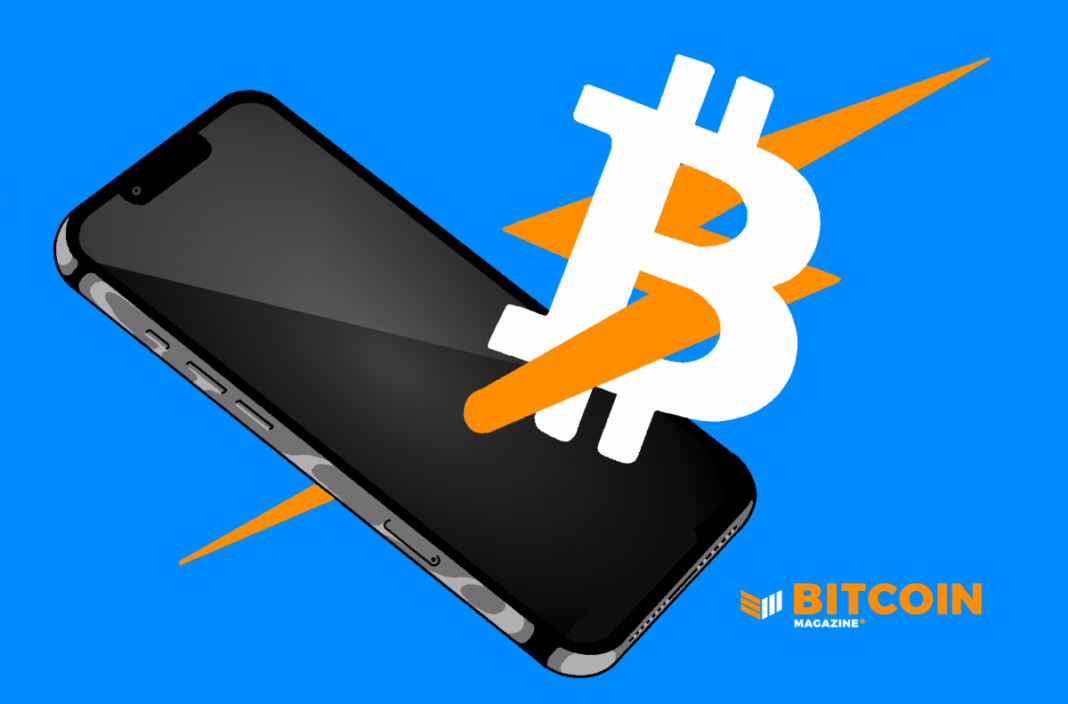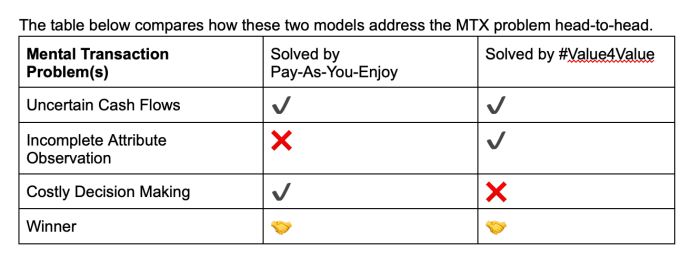That is an opinion editorial by means of Will Schoellkopf, writer of “The Bitcoin Canine” and host of the Bitcoin podcast “It’s So Early!”
In relation to paywalls as opposed to #value4value, is it in reality all or not anything?
Writer’s be aware: My goal isn’t to assault any person in my opinion. I will be able to use explicit other folks’s quotes for my examples, however my intent is to respectfully problem concepts, no longer assault other folks. Wholesome debate of concepts in excellent religion is helping Bitcoin, so I am hoping they perceive.
In Gigi’s article, “The Freedom of Value,” he breaks down what’s damaged with the monetization of data, “The issue with the web is that data needs to be loose.”
As a content material writer, in my case a author, this drawback with the web hits house. It’s numerous paintings to put in writing excellent content material, and I don’t paintings at no cost. I glance to be compensated for my proof-of-work. Because the Joker says, “When you’re excellent at one thing, by no means do it at no cost.”
Gigi breaks down the issue of simply seeking to promote data (like a written e book/article) in the back of a paywall into two distinct causes, the “MTX drawback” (Psychological Transaction drawback) and the “DRM paradox” (Virtual Rights Control paradox).
I recognize the “DRM paradox” has no answer: “content material will most effective keep locked in the back of paywalls if it sucks. If it is excellent, it’ll be set loose.”
Moreover, Gigi explains: “The MTX drawback, with MTX being brief for ‘psychological transaction,’ refers back to the drawback of irreducible psychological transaction prices inherent to each transaction. Each time you hit a paywall, you need to make a aware determination: ‘Do I need to pay for that?’”
Since Gigi “consider[s] that the MTX drawback is a larger deal than the DRM paradox,” that will likely be the focal point of this text. Gigi recognizes the normal option to spare the shopper of the headache of psychological transactions is the subscription fashion, however then such a lot of other subscriptions are wanted for unique content material that it turns into impractical once more.
With an open thoughts, keen to look no longer simply black and white however entertain sunglasses of grey, please imagine how lightning microtransactions, deployed the best approach, can paintings in opposition to fixing the psychological transaction drawback. As Nick Szabo states:
“A micropayments machine assumes a option to the psychological accounting drawback. If someone may just in fact clear up this drawback … the financial savings could be huge even in present industry … to not point out the entire new probabilities conceivable by means of decrease transaction prices.”
To start, why do other folks get pleasure from simply outright purchasing a e book? Nick Szabo solutions this concisely: “A flat rate constitutes an embedded, implicit insurance coverage contract.”
After I be offering my guide at a flat worth, the reader is protected. They know they personal it and will learn it at their recreational. On the other hand, this flat worth creates a barrier to access. It turns into all-or-nothing in the event that they need to learn the guide. But when I destroy this barrier into items, and make every bankruptcy a mini paywall pay-per-click lightning transaction, then the reader most effective will pay for what they get pleasure from!
Input: the pay-as-you-enjoy fashion. If the reader enjoys the bankruptcy, they are able to pay-per-click to learn the following one, and the following one. In the event that they’re finished studying sooner than having reached the top, they’ll have spared themselves from having to pay to learn the entire e book. It wasn’t all-or-nothing!
Via pay-as-you-enjoy, the reader loses the insurance coverage that I received’t build up the fee according to bankruptcy as they proceed to learn in the course of the e book through the years, however cling onto that idea for slightly.
Nick Szabo issues out the issues of the pay-per-click monetization fashion: “There was floating for some time the speculation of ‘ppc,’ a micropayment for each click on at the Internet to pay its proprietor for content material. On the other hand, since there was no likelihood to browse the content material, there is not any technique to without delay confirm whether or not it meets tacit personal tastes: there is not any correct buyer observable specific choice. Surfing a preview or e book duvet continues to be erroneous, and includes expanding psychological prices the extra correct it’s.”
Once more, I’m construction in opposition to a option to the psychological transaction drawback. “Characteristic statement prices” are nonetheless provide, and that’s adequate. There’s no characteristic statement value in Value4Value since the reader can stay studying with out paying anything else in any respect. No value according to click on. Even nonetheless, Value4Value confronts the similar ultimate drawback that pay-as-you-enjoy tackles head-on. As Nick Szabo concludes:
“Assuming, for the instant, best possible data at the product to hand, and no uncertainty as to long term money flows, a 3rd and extra elementary supply of shopper cognitive value stays, specifically the price of making choices with a big, however however very incomplete, set of possible choices.”
Even though the reader already knew the whole lot concerning the content material, and knew evidently their finances, how can they know for positive they will have to spend their cash in this as an alternative of one thing else?
In apply, shoppers simply make choices as a result of they’ve to. The psychological transaction drawback persists as a result of they’re both deciding whether or not to offer price again when they’ve completed studying, or they’re freed of this as a result of they’ve already spent the cash to learn the paintings within the first position.
Value4Value is simply delaying the psychological transaction drawback till after the reader has completed studying. As Adam Curry explains, “The Ask is an important piece of the puzzle. The number one reason other folks don’t give to charities and the like is as a result of they weren’t requested, and the similar is right for the Value4Value fashion.”
Since a part of the Value4Value loop is “The Ask,” it hasn’t mounted the “expensive determination making” piece of the Psychological Transaction Downside. As opposed to pay-as-you-enjoy, my readers can end studying and really feel excellent that they’ve paid a value I felt was once truthful, moderately than combat internally on who to make stronger.
If truth be told, with lightning, I believe we’ve come on the subject of fixing the clever agent drawback Nick Szabo describes:
“There turns out right here to be a elementary cognitive bottleneck. One proposed option to this has been “clever brokers”. However since those brokers are programmed remotely, no longer by means of the shopper, it’s tricky for the shopper to resolve whether or not the agent is appearing the shoppers’ absolute best pursuits, or in the most efficient pursuits of the counterparty — possibly, essentially, a minimum of as tricky as studying the corresponding complete remark of fees. Moreover, the consumer interface to allow shoppers to easily categorical their refined personal tastes to an agent is missing, and might constitute any other elementary cognitive bottleneck.”
Nick describes an “clever agent” as anyone the shopper delegates to make purchases on their behalf – sparing them the headache – however then they nonetheless have to provide an explanation for to the agent what they get pleasure from. As a part of pay-as-you-enjoy, as soon as the shopper units up their finances (their “flat rate” insurance coverage discussed above), they’re loose to have interaction in pay-per-click studying with out concern about overspending! This agent which deducts sats according to click on isn’t programmed remotely, however by means of the shopper. Additionally, the shopper sees the writer’s financial coverage up entrance after they set their finances. They know the associated fee according to bankruptcy, but additionally how a lot to spend to get one month of loose get entry to – an incentive to offer the writer what they see as the overall price for his or her paintings! The pay-as-you-enjoy consumer interface is slick. The patron units their finances after which it’s pay-per-click!
Nick Szabo summarizes the MTX drawback as the next:
“We’ve noticed how buyer psychological transaction prices can derive from a minimum of 3 resources: unsure money flows, incomplete and dear statement of product attributes, and incomplete and dear determination making. Those prices will increasingly more dominate the technological prices of fee techniques, environment a prohibit at the granularity of bundling and pricing. Costs do not come at no cost.”
Within the desk above, they’re tied. On the other hand, relating to written content material like books, I believe pay-as-you-enjoy has the brink.
As Adam Curry issues out, only ~4% of people give value back. For him and his established podcast target market, he thinks that’s adequate. He says, “One way or the other, on the other hand, all of it works out after all.”
This “One way or the other” is deceptive. He emphasizes the desire for the “Feedback Loop.” “Long past are the times of static broadcasting.
- Ask
- Recognize
- Repeat”
Books don’t seem to be residing, respiring paperwork. They’re static. If acknowledgment and the comments loop are had to monetize 4% of your readers, that’s numerous power for brand spanking new authors with out a big following or technique to give acknowledgment again.
I’ll spare my readers the expensive determination making on the finish of the paintings. I’ll allow them to pay-as-you-enjoy! And I’ll enforce a donate button and a spice up button as neatly so they are able to give additional price again in the event that they specifically like a scene!
You’ll check out lightning enabled pay-as-you-enjoy at BitcoinDogBook.com, powered by means of Mash! In a followup article, I provide a technical structure breakdown of the way content material creators can enforce the similar fashion!
It is a visitor put up by means of Will Schoellkopf. Critiques expressed are solely their very own and don’t essentially mirror the ones of BTC Inc. or Bitcoin Mag.










![Methods to Purchase DeFi Pulse Index on CoinStats [The Ultimate Guide 2022]](https://bitrrency.com/wp-content/uploads/2022/05/DeFi_Pulse_og-100x70.png)

